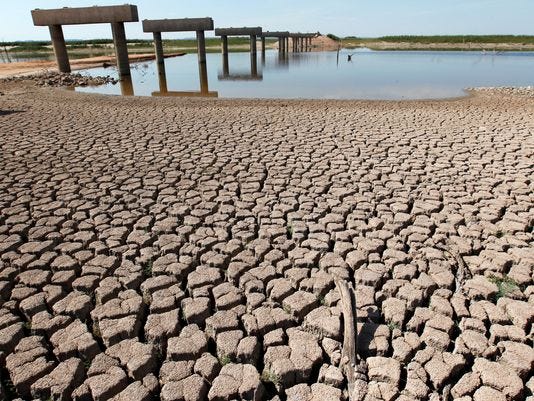 |
| (Photo: Patrick Dove AP) |
Decision could impact multistate water compacts that are common throughout the West.
Story Highlights
WASHINGTON — With water, water virtually everywhere, the Supreme Court ruled Thursday that thirsty Texas counties can't run a pipeline into Oklahoma for more drops to drink.The decision, which upholds two lower court rulings, is a victory for states' rights over multistate water compacts that are common throughout the West. Justice Sonia Sotomayor wrote the opinion for a unanimous court.
On one side of the dispute was Texas, accused of trying to divert water from Oklahoma under terms of a four-state compact that entitled each state to up to 25% of the water from a segment of the Red River. On the other was Oklahoma, asserting that Texas can get the water from within its borders or elsewhere.
"This is a major victory for Oklahoma, with all nine justices agreeing with our argument that Texas does not have the right to come into Oklahoma and take our water," Oklahoma Attorney General Scott Pruitt said. "This unanimous decision will affect all western states governed by multistate water compacts."
The battle was being watched closely by other states with interstate compacts similar to the one the two states share with Arkansas and Louisiana. There are more than two dozen compacts nationwide, mostly in the West, and at least nine with similar provisions.
The battle is critical for nearly 2 million residents of the Dallas-Fort Worth area who get water from the Tarrant Regional Water District. The fast-growing area needs far more water than it has; it warns that if it goes dry, other areas reliant on such compacts could as well.
Under the 35-year-old compact, each of the four states is entitled to no more than 25% of the water. The dispute was over where they could go to get it. Because the main stem of the river is salty, tributaries such as the one in Oklahoma that enticed Texas are considered preferable.
The Lone Star State had lost in both lower federal courts, which ruled that Oklahoma can bar such water invasions. Texas contended that the four-state compact, approved by Congress, should trump state laws, and the U.S. Department of Justice agreed.
During oral argument in April, Lisa Blatt, the attorney representing Oklahoma, said Texas' claim was unprecedented. If granted, she said, it would produce "open season for Oklahoma water" and lead to a situation in which "every state could have crisscrossing pipelines into every state."
Follow @richardjwolf on Twitter.
No comments:
Post a Comment